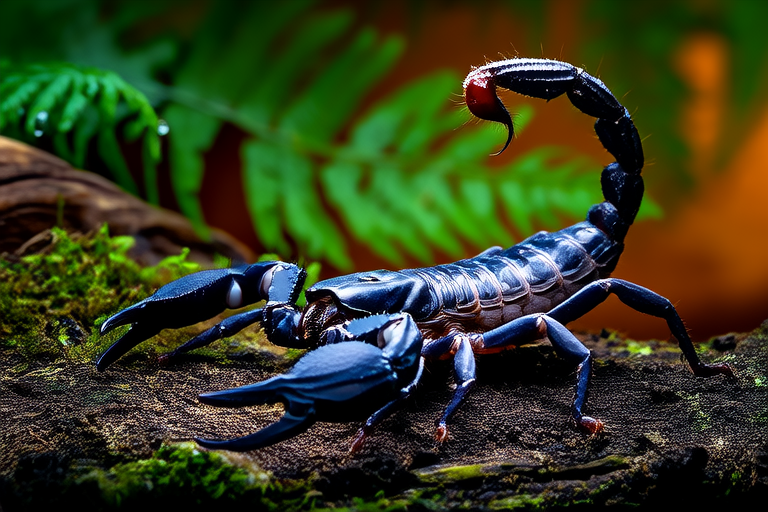From Jungle to Home: Caring for Your Exotic Pet, the Heterometrus Spinifer
The Heterometrus spinifer, commonly known as the Indian forest scorpion, is a fascinating and often misunderstood creature. This article will guide you through understanding this exotic pet, covering its natural habitat and behavior, legal considerations, care instructions, and the importance of social interaction and environmental enrichment.
Introduction to the Species
The Heterometrus spinifer belongs to the family Scorpionidae and is native to the tropical forests of India, Sri Lanka, and parts of Southeast Asia. These scorpions are known for their robust build and distinctive spines on their tail, which give them their common name. They are nocturnal predators that primarily feed on insects and other small invertebrates.
Natural Habitat and Behavior in the Wild
In their natural habitat, Heterometrus spinifer live in moist, humid environments, often found under logs, rocks, or within crevices. Their preferred temperature range is between 75°F and 85°F (24°C to 29°C), and they require high humidity levels, typically around 70-80%. These scorpions are solitary creatures, except during mating season, and they are highly territorial. They rely on their powerful pincers and venomous stinger to capture prey and defend themselves against threats.
Legal Considerations of Owning One as a Pet
Prior to bringing a Heterometrus spinifer into your home, it’s crucial to research and comply with local laws and regulations regarding exotic pets. Some regions may have restrictions or require permits for keeping certain species. Always check with local authorities or consult a legal expert to ensure compliance with all applicable laws. Additionally, be aware of any quarantine periods or health certifications that may be necessary before importing the scorpion.
Detailed Care Instructions
Housing
A suitable enclosure for a Heterometrus spinifer should mimic its natural environment as closely as possible. The tank size should be at least 18 inches long, 12 inches wide, and 12 inches tall for a single adult. Ensure there is adequate ventilation while maintaining proper humidity levels. Provide hiding spots such as cork bark or half logs, and include a shallow water dish for drinking and occasional soaking. Substrate can consist of coconut fiber or peat moss mixed with sand or soil to retain moisture.
Diet
The Heterometrus spinifer is carnivorous and requires a varied diet to thrive. Feed them appropriately sized insects like crickets, mealworms, super worms, and dubia roaches. Offer food every 2-3 days, adjusting frequency based on the scorpion’s activity level and body condition. Gut load feeder insects with nutritious foods prior to feeding them to the scorpion to ensure optimal nutrition.
Health Concerns
Regular monitoring of your Heterometrus spinifer’s health is essential. Common issues include dehydration, mite infestations, and improper shedding. Signs of poor health may include lethargy, refusal to eat, or changes in coloration. Consult a veterinarian specializing in exotic animals if you notice any concerning symptoms. Quarantine new acquisitions separately from existing pets for several weeks to prevent introducing diseases into your established collection.
Handling Tips
While handling is not recommended due to the risk of injury from the scorpion’s sting, it is sometimes necessary for routine maintenance or veterinary care. When handling is required, wear thick gloves and approach slowly and calmly. Avoid sudden movements and allow the scorpion time to adjust to your presence. If bitten, clean the wound thoroughly and seek medical attention if pain persists or worsens.
The Importance of Social Interaction and Environmental Enrichment
Although Heterometrus spinifer are solitary by nature, providing environmental enrichment can enhance their overall well-being. Introduce novel objects periodically to stimulate exploration and provide mental stimulation. Rotate decorations within the enclosure to encourage natural behaviors such as hunting and hiding. While direct interaction is limited, observing your scorpion’s daily activities can strengthen your bond and improve its quality of life.
Advice on Responsible Pet Ownership
Owning an exotic pet like the Heterometrus spinifer comes with significant responsibilities. Ensure you’re committed to providing lifelong care before acquiring one. Research thoroughly, prepare adequately, and be prepared for unexpected challenges. Remember that these animals have specific needs that must be met consistently over many years. By taking these steps, you’ll help ensure a healthy and happy life for your unique pet.
Where to Find Reputable Sources for Further Information
To deepen your knowledge about caring for your Heterometrus spinifer, consider joining online forums dedicated to exotic pets or consulting books written by experts in herpetology. Many zoos and aquariums also offer educational programs and resources related to various species, including scorpions. Stay informed about advancements in husbandry techniques and always prioritize your pet’s welfare above personal convenience.
